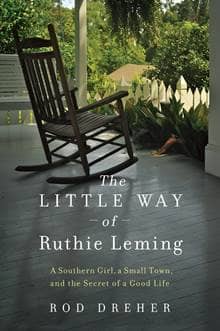
“I don’t know why, Rod, but it really was true,” Ruthie’s best friend confided to me after her death. It’s a mystery to my parents, too. But they, and all those closest to my sister, knew it was real.
Ours was an emotionally complicated relationship. I teased her a lot as a kid. In one instance from early in our childhood, our father was planning to deliver one of his rare spankings for something mean I had done to Ruthie. As I lay on the bed ready to receive the spanking I deserved, she threw herself across my back and begged our dad to spank her instead.
This little girl, who couldn’t have been more than four or five at the time, demanded to take my punishment for something I had done to her. That was Ruthie.
But Ruthie was also the kind of person who, once she made up her mind about someone or something, never changed it. After I moved away from Louisiana in 1992 in pursuit of my journalism vocation, Ruthie hardened her heart towards me. I was the brother who betrayed the family by leaving it. Slowly but perceptibly, the distance between us grew.
Over the years, when I would visit, I could sense the tension between us. I wanted to talk about it, to work it out. Shouldn’t brothers and sisters be able to do that? Shouldn’t Christians? But Ruthie wouldn’t have it. She hated to have emotional conversations.
Days after her terminal cancer diagnosis in 2011, I sat with her in the sunshine of her front porch, and asked her to forgive me every bad thing I had done to her over the years. I wanted to put our past behind us, to talk about the ways we had hurt each other, and to speak words of penitence and mercy to each other.
Again, she wouldn’t have it. It was too hard to say these things. She waved my words away, offered none of her own, and embraced me. We cried on each other’s shoulder, and I thought this was her way of apologizing and forgiving.
I returned home to Philadelphia and got busy contacting estranged friends and family members, told them that Ruthie’s cancer compelled me to re-think my own life and actions, and asking them to forgive me the wrongs I had done them. The walk of life is too hard to undertake carrying grudges.
Several months after Ruthie died, her teenage daughter Hannah told me that it would be hard for her younger sisters to get close to me because their mother had often spoken ill of me to them – even in the last months of her life. Hannah said that she knew her mother’s judgments were not fair, but her sisters had no reason to distrust their mother. And this, Hannah said, would be a problem for me.
Every day I wrestle with this part of my sister’s legacy. Her friends tell me that she loved me, and I believe it. I really do. They tell me things she said about me that make her affection clear. Yet she never said those things to me, and rebuffed my attempts to clear the air between us. Why? I don’t know.
And now, with Ruthie gone, I never will. I fear that the pain of rejection, of unfinished business between my sister and me, will stay with me until, in God’s mercy, we are reunited in heaven.
This has taught me, though, the urgency of seeking and offering forgiveness. We do not know when death will come for us. The weight of forgiveness withheld is a terrible burden to leave for others. Ruthie loved family more than anything, but without meaning to, she made it harder for our family to be strong in her absence, because of the mistrust and suspicion of their uncle she left for her younger children.
My sister was breathtakingly courageous in the face of cancer. Her tragedy – our tragedy, and our family’s tragedy – is that she was not once brave enough to say to me, “I forgive you, brother; please forgive me too.”
Rod Dreher is a Beliefnet columnist and the author of The Little Way Of Ruthie Leming, which has just been published by Grand Central. Follow him on Twitter @roddreher, or connect with him at the Rod Dreher fan page on Facebook.

